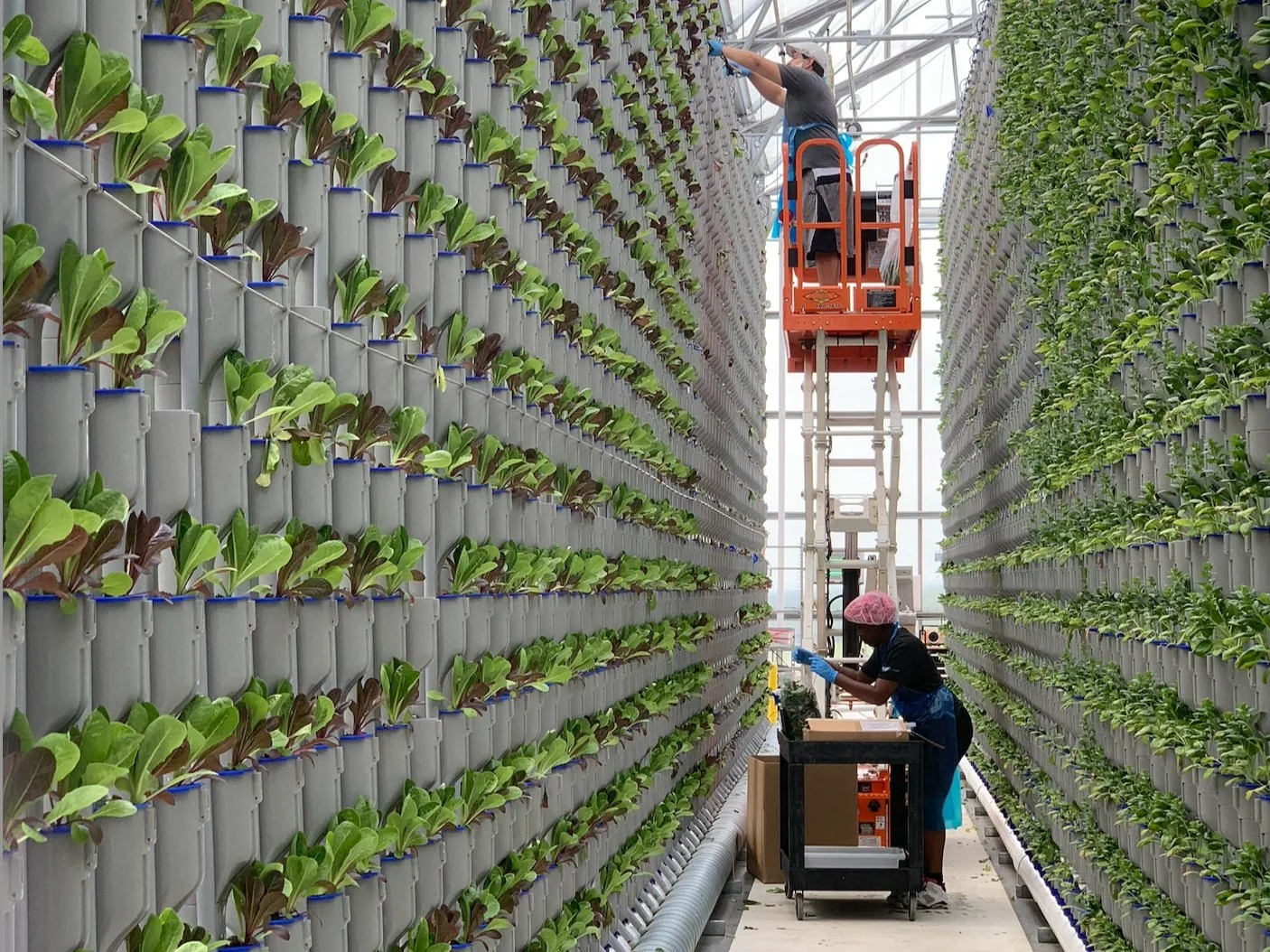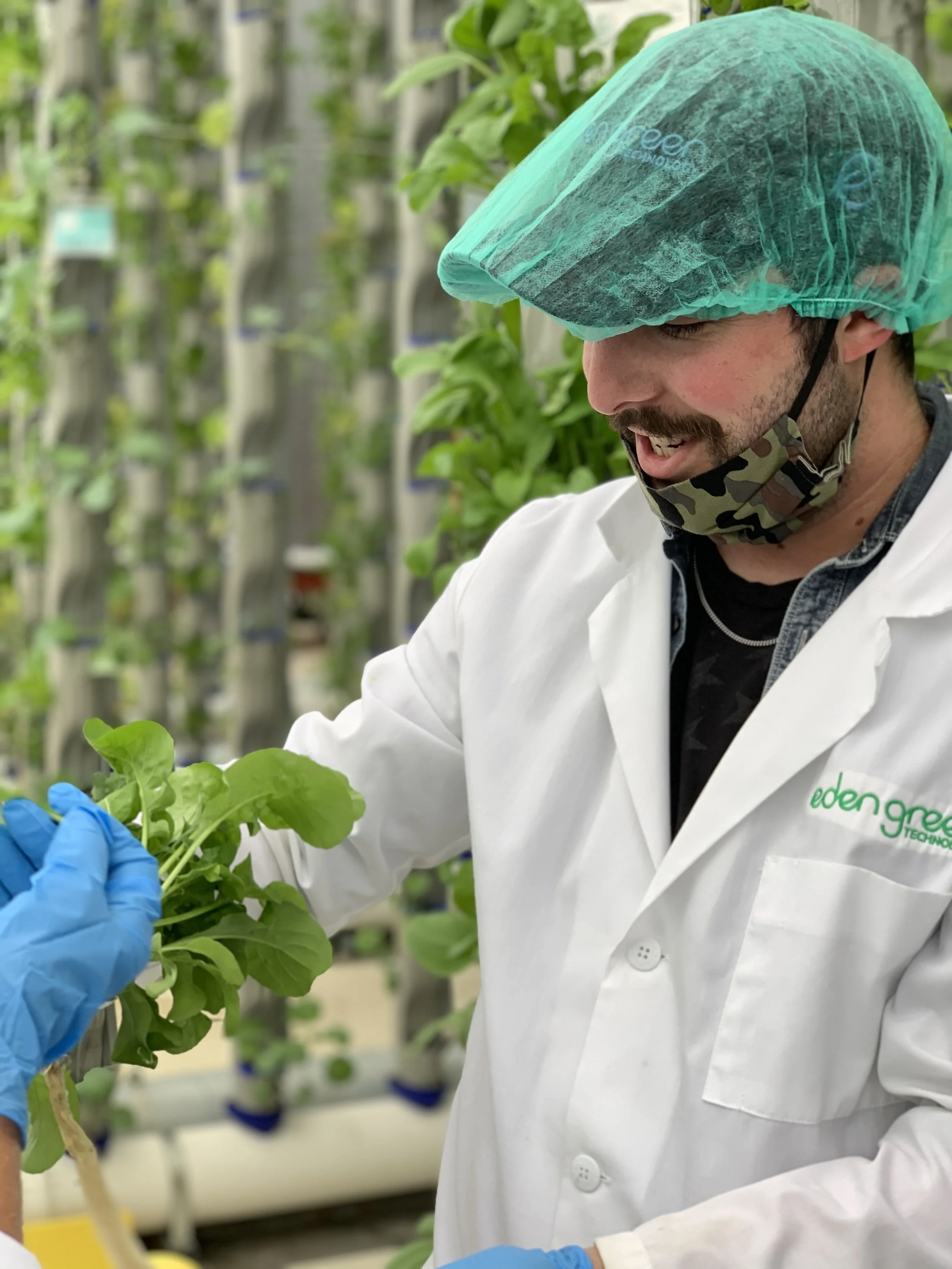Sustainable Agriculture & AgTech: Creating Jobs, Building Cities
In the heart of sustainable cities, a green revolution is unfolding. Urban agriculture is emerging as a beacon of innovation in sustainable city development. Vertical indoor farming, in particular, is gaining attention. This approach revolutionizes how we think about urban agriculture. It also opens up many job opportunities.
Cities today are trying to become more sustainable. This makes the importance of urban agriculture careers more obvious. Vertical indoor farming embodies the essence of socially responsible businesses. It contributes to food security, reduces carbon footprints, and fosters community engagement.
Understanding Urban Agriculture
To grasp the significance of urban agriculture, it’s crucial to recognize its versatility and impact. Traditionally, farming conjures images of expansive rural fields. However, urban settings demand innovation.
Urban agriculture—encompassing rooftop gardens, community plots, and technologically advanced indoor vertical farms—responds to this call. It adapts to the urban milieu, turning underutilized spaces into verdant, productive zones.
This shift addresses food deserts and offers a resilient, scalable model for fresh food production directly within city confines.
Urban Agriculture's Role in Modern Cities
The value of urban agriculture in contemporary urban centers cannot be overstated. As cities grapple with challenges like rapid urbanization and climate change, urban farming emerges as a sustainable solution.
It localizes food production, reducing the carbon footprint associated with traditional agriculture and long-distance transport. Moreover, it introduces a spectrum of agtech jobs, from hydroponic technicians to sustainability coordinators, enriching the community with diverse career opportunities.
Click here to see which cities are prioritizing urban agriculture.
The global vertical farming market size was $5.05 billion in 2023 & is projected to grow from $6.22 billion in 2024 to $40.45 billion in 2032 at a CAGR of 26.4% during the forecast period (2024-2032). North America accounted for a market value of $1.96 billion in 2023. Source.
Urban Agriculture and Job Creation
Urban agriculture initiatives are increasingly recognized as a catalyst for job creation. This is particularly true in areas grappling with high unemployment rates. By introducing urban agriculture food jobs, these initiatives offer diverse employment opportunities within the sector.
Urban farms support economic development. They tap into the growing demand for local, sustainable food. They also empower workers by providing meaningful work. This work promotes environmental stewardship and food security. Urban agriculture is opening new pathways for employment and sustainable urban development. It's happening through innovation and community engagement.
The global Hydroponics market size was valued at USD 17457.46 million in 2022 and is expected to expand at a CAGR of 7.08% during the forecast period, reaching USD 26321.93 million by 2028. Source
Types of Jobs in Urban Agriculture
Urban agriculture is a fertile ground for job creation. Urban agriculture food jobs include roles including:
Horticulturists (who care for crops in various types of farms)
Arborists (who care for trees)
Agronomists (who study crops and plants)
Hydroponic Technicians
Management
Accounting
Marketing
Community Outreach
Maintenance
Distribution
These positions cater to a diverse skill set, from entry-level workers to those with advanced degrees. They highlight the sector's inclusivity and potential for economic growth.
5 Exciting Vertical Farming Careers
Although there are dozens of roles in a vertical greenhouse, here are some of the most in-demand roles at the moment.
Grower
Growers are in charge of plant health. This job involves nutrition, horticulture, and propagation. It’s a blend of science, art, and problem-solving. The grower is responsible for meeting the greenhouse’s quality standards and yield quota. Growers can specialize in developing seedlings in propagation or be responsible for plants' health throughout their farm lifecycle.
A grower has many daily duties, including:
Maintain crop schedule to ensure all crops are cared for on schedule to maintain optimal health and growth.
Coordinate with the production supervisor on crop issues, transplant times, and harvest dates.
Walk crops daily to ensure they are growing as expected and address any issues witnessed.
Maintain climate and growth factors in all stages of plant growth to meet production needs.
Monitor and adjust irrigation, nutrient, lighting, and climate to minimize farm environment variation and optimize plant health and output.
Direct plant health team on data collection, management, and analysis.
Work closely with the facilities team to maintain a proper growing environment.
Communicate between growing, operations, sales, and distribution teams on schedule.
This job is ideal for someone who loves gardening and caring for plants. Beyond soil, most vertical farms grow their crops using hydroponic or aeroponic methods. Experience and knowledge of these systems are mandatory for most grower positions. Someone with a green thumb who is an excellent team player and communicator would excel in this role.
Production
At Eden Green Technology, someone in production is in charge of handling the process for mature plants. This means harvesting, packing, and logistics. Their daily tasks include:
Transplanting produce from propagation to their microclimates in our vertical towers
Sanitizing equipment and plant spots as needed
Harvesting mature plants
Cleaning and packing produce
Maintaining harvest schedules and working closely with the grower and facilities team to optimize production efficiencies
This role involves a lot of climbing, so it is not recommended for someone who has an aversion to heights. It’s ideal for someone who excels at methodical work and is highly focused.
Food Safety Manager
The food safety manager has one of the most important jobs: keeping our farmers and the public safe. Hydroponic vertical farming is one of the safest farming methods possible, but a food safety manager still has a crucial role. Their tasks include:
Keeping the team and customers safe
Auditing and testing for salmonella, listeria, e. Coli, etc.
Tracing and trackability with QR codes and blockchain
Providing proper Personal Protective Equipment (PPE) and ensuring it is used correctly
Certifications and compliance
Educating the team and visitors
Part of this job includes keeping up with ever-changing regulations and new technologies to track produce and keep food safe. Someone passionate about cleanliness, food safety, and consumer welfare would greatly enjoy this job.
Integrated Pest Management (IPM)
The danger of pests is limited in an indoor greenhouse, but it is still possible. That is why integrated pest management specialists work to keep produce safe from pests that would prevent it from getting to harvest. They have several tasks, including:
Regular inspection of greenhouse walls for pest access points
Setting/managing pest traps
Daily crop scouting and spot treatment
Conduct weekly training sessions - identification, prevention, and awareness
Daily check-ins with supervisors and food safety professionals
Someone with an eye for detail and a passion for eradicating pests would enjoy IPM very much. It’s a job that involves constant vigilance and is integral to the success of the greenhouse.
Facilities Technician
A facilities technician is a familiar job in any industry. Of course, they’d be in charge of maintenance, construction, and janitorial duties, but they would also be in charge of food safety support. They would need to be detail-oriented and maintain daily records. The facilities technician would need to have knowledge in the following areas:
Electrical
Plumbing
HVAC
Forklifts, scissor lifts, or other warehouse machinery
Food safety
A jack-of-all-trades with an interest in food may take an interest in this job. Having an eye for detail, an adaptable nature, and an ability to communicate with others is important.
Urban Agriculture as a Career Pathway
Career Options in Urban Agriculture
Urban agriculture is rapidly expanding. It offers diverse career options catering to various interests and skill sets. Urban agriculture careers include roles directly involved in food production. They may be urban farmers, greenhouse managers, and hydroponic technicians. These positions focus on cultivating fruits, vegetables, and herbs in urban settings. They use innovative farming techniques to maximize yield in limited spaces.
Beyond production, urban agriculture also encompasses distribution, marketing, and education roles. Community outreach coordinators connect urban farms with local communities, schools, and businesses. Urban agriculture educators also help with this. They aim to better understand sustainable food systems and local food production. Marketing specialists and sales managers are essential for promoting urban agriculture products. They must navigate the unique challenges of urban markets to ensure the success of local food initiatives.
These career paths, and others in urban agriculture, show the industry's diverse opportunities. They include everything from hands-on farming jobs. They also include roles that support the broader mission of sustainable urban living.
Skills and Education Required
Entry-Level Positions: Minimal advanced education is needed, with jobs focusing on manual labor. On-the-job training is typically provided to help students understand essential systems and processes.
Advanced Careers:
Technical Knowledge: Essential in horticulture, agronomy, or hydroponics. Formal education, such as degrees in agricultural science or certificates in urban farming, is often pursued.
Soft Skills: Critical for teamwork, communication, and problem-solving. Urban agriculture requires collaboration with various stakeholders, from community members to local businesses.
Educational Pathways: Options vary from vocational training and workshops to bachelor's and master's degrees, catering to different professional aspirations.
Continuous Learning: Urban agriculture is evolving; adaptability and a commitment to ongoing education are vital.
Contributing to Sustainable Cities Through Urban Agriculture
Urban agriculture stands at the crossroads of innovation and sustainability. It contributes significantly to the development of sustainable cities. These initiatives reduce the carbon footprint of traditional agriculture. They also cut emissions from food transport. They do this by converting urban spaces into green, productive areas. They also offer a fresh take on city living, incorporating green spaces into places where they may be rare.
Integrating outdoor gardens and farms into urban landscapes provides residents access to fresh, nutritious produce. It also enhances biodiversity, helps filter pollution from the air, and beautifies the city’s environment.
The role of urban agriculture in promoting environmental health is complemented by its contribution to social well-being. Urban farms and community gardens foster a sense of belonging and community spirit. They encourage residents to collaborate and connect over food production. These green spaces serve as educational platforms where people of all ages can learn about the importance of local food systems.
Investment Opportunities with Eden Green Technology
Investors hold transformative power in urban agriculture. This sector is critical to forging sustainable cities and creating urban agriculture food jobs. Their financial input fuels innovations that make urban farming more efficient and scalable. Through this investment, they can directly impact food security and job creation in urban environments.
Investors’ commitment to urban agriculture propels the growth of green spaces within cities. This enhances the well-being of urban communities and the environment. Investor support drives economic growth by generating jobs. It also contributes to making cities more resilient and sustainable. Investors' role goes beyond financial contributions. It signifies belief in a greener, more sustainable urban future.
For those looking to make a significant impact, investing in urban agriculture offers a unique opportunity. It puts you at the forefront of sustainable urban development. By backing urban farming initiatives, investors support the development of green technologies and practices. These are essential for the future of urban living.
Eden Green Technology wants to partner with investors who are passionate about contributing to sustainable cities. Your investment can help shape the future of urban farming and sustainability.







